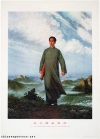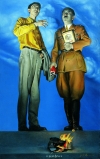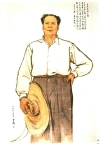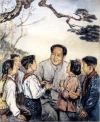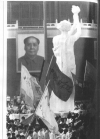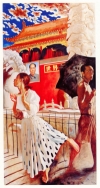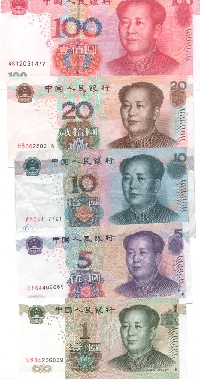
Illustration:
ill. 5.64
Author:
Liu Wenxi (1933-) 刘文西
Date:
since 1999
Genre:
article of daily use, yuanbills
Material:
scan, photograph, colour; original source: yuanbills, paper, colour
Source:
Chinese Currency: Paper-Yuan-bills/Renminbi (Private copy/photograph).
Courtesy:
Barbara Mittler
Inscription:
中国人民银行, 壹 佰圆 ,贰拾, 拾圆, 伍圆, 壹 圆 , 毛泽东 (1893 - 1976)
Keywords:
Mao Zedong, Mao portrait, everyday life, money, yuanbill, renminbi, Liu Wenxi
Chinese Currency: Yuanbills / Renminbi
In “socialist capitalist” China, Mao gains ever greater currency, and literally so: one important carrier of Mao’s visual presence that I have not touched on so far is paper money. The ubiquity of Mao’s image on Chinese renminbi (人民币) or yuan (元), however, is only a recent phenomenon: since its introduction in 1948, five series of paper bills have been issued. Only the last, released in 1999, displays a portrait of Mao, painted specifically for this purpose by Liu Wenxi, on all Chinese yuan-denominations.
Earlier series were issued in 1948; longest in use (into the 1980s) were the second and third series first published in 1955 and the early 1960s respectively. None of these carried Mao’s image. Although in 1948 a suggestion had been made to depict Mao on paper bills (as on earlier money bills used in the early 1940s), he rejected this idea in favor of depicting the working people, peasants, and soldiers (Wang 2003). During preparations for the 1955 series, another attempt was made to introduce, if indirectly, Mao’s image, either by showing Tian’anmen with his portrait, or a Mao portrait carried in a procession or attached on a locomotive.
Again, these drafts were rejected by Mao personally—who, so the legend goes–is said to have strongly disliked even the touch of money (Quan 2006, 75–76). A last attempt was made in 1969, during the Cultural Revolution, to be disallowed by Mao once more. It was only in the late 1980s, when a new series of bills was being introduced, that they began to include portraits of the four early leaders of the PRC: Mao Zedong, Zhou Enlai, Liu Shaoqi, and Zhu De. These were replaced by bills featuring Mao on his own since 1999. Since then, at least, Mao has been “highly current.”
